The Coronavirus pandemic is causing huge damage in both physical and psychological terms in all fields of life. At the moment, approximately eight million people are working in the cultural sector in Europe. As the COVID-19 spreads and the lockdown expands country by country, we are evermore aware of the fact that the creative sector has been greatly impacted, partly due to lack of proper funding. What challenges are we facing now, and what is ahead of us? How can we help the creative community that was already struggling a lot to get by, and how can we make sure that we learn something from this experience when the emergency is over and make the most of it?
Daniela Patti (Rome) and Bahanur Nasya (Vienna), managers and community experts at Eutropian moderated Cooperative City in Quarantine #3, a live panel on how the cultural sector is coping with this crisis, featuring guests from cultural workers scattered across Europe and beyond.
The discussion was very rich and some key points strongly emerged:
- Cultural workers, due to the strong precariousness within the sector for years, need a strong social security to protect them;
- Solidarity funds needs to be activated in order to support especially those smaller cultural organizations that make the social tissue vibrant, an example being the one promoted by the European Cultural Foundation;
- Cultural centres, at least those operating in public properties, should have a rent freeze in these months of inactivity;
- Running programs and funds for cultural programs should be made flexible in order to support the planned activities after the end of the current crisis;
- The cultural sector is responding in many constructive ways to the current emergency, as in the case of the Menù della Poesia, and more public visibility should be ensured to these valid initiatives.
We collected video contributions showing how this new state of emergency has affected many cultural workers’ daily lives. For example, Işin Önol, lecturer, curator and art critic at Montclair University, New York, contracted the virus just before the faculty would stop activities, and even though she luckily recovered, she will now be continuing her teaching activities through distance learning.
Unfortunately, a compromised physical health is only one of the dangers the COVID-19 pandemic exposes people to: like many others, Phil Moran from Viennese FFAB Film and TV is now facing hardships due to the fact that most assignments are now suspended. Yilmaz Vurucu, Vienna-based film director at Xsentrikarts points out that during the past weeks many cultural workers in several countries have been granted emergency funds, yet they don’t know how to immediately access them because of an unprepared, slow bureaucracy.
Andrea Kovács, founder at LET IT BE! Art Agency, Budapest believes that all kinds of cultural institutions have to rethink their whole structure, finding out how they can survive. According to her, the biggest issue is that the digital space is proving to be the new performative space, so live performers and exhibitors need new social security measures in order to survive while reinventing their jobs, as most of them immediately lost their income as soon as the lockdown began. She is convinced that the present system is not sustainable anymore, and since culture is the creative field of human activity par excellence, this is the time when cultural workers have to rethink what culture means, collaborating with one another more than ever.
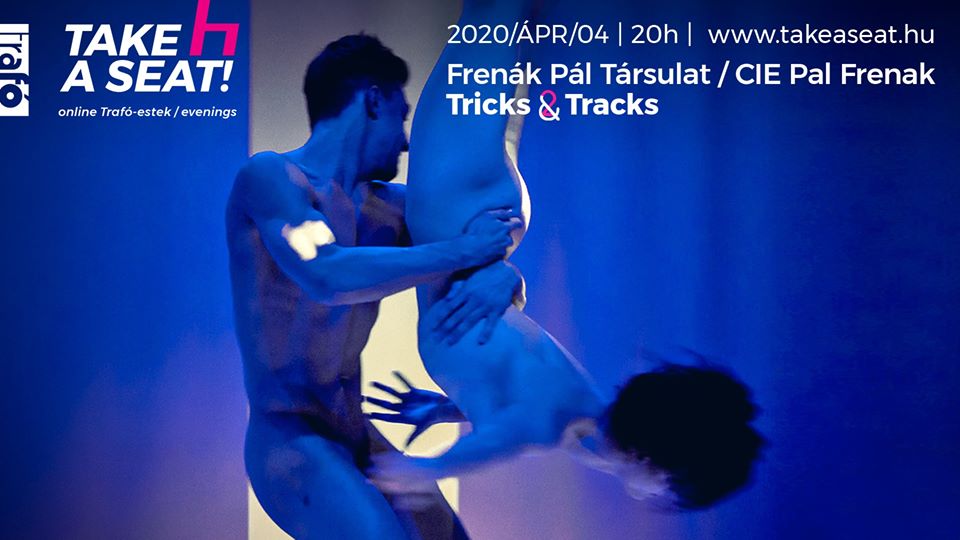
Marta Silva, director at Largo Residencias, Lisbon also agrees with the fact that culture is one of the sectors with the weakest social protection system, and that governments haven’t been doing enough to protect workers already in the past, let alone right now. And despite artists having been generously developing many online free shows, their economic conditions for survival are ever more a topic of debate. This brings to the conclusion that policies need to change, fast.
Yet, however complicated and unsatisfactory social security in Europe can be, this unprecedented situation looks very different overseas: Anikó Erdősi, curator and currently director of Donald Ellis Gallery in New York, remarks how the U.S cultural context is the most capitalistic one, where funding mostly comes from private sources, being almost totally philanthropic and much more relying on market dynamics than in Europe. What happened during the last weeks is similar to what happened elsewhere. A lot of people lost their jobs, making both small and big organizations suffer. “The biggest institutions haven’t started laying off people, while smaller ones ceased all activity, being totally dependent on the gig economy. Many cultural workers usually have day jobs, but as the lockdown progressed, most of them lost their jobs overnight. Even though the city of New York has a long history of social organizing, and even if lots of non-profit organizations started to act on the issue, the problem is expanding and there aren’t enough resources to save everybody”, she observes.
But how are things in European cities that are increasingly investing in culture, acknowledging it as a very important asset?
Fabrizio Barbiero, Public Manager at the Municipality of Turin
“Actually, I can personally relate to what is happening in New York. Everything is closed and it’s not easy to turn “physical” cultural activities into “virtual” ones. This is very strange because this phenomenon is not a war, you can’t escape it. It’s “just” a pandemic that needs to stop, but nobody knows when it will stop. The sector is risking a setback that could last for even a year or more, considering all the projects have been halted. The biggest issue is how to avoid fixed costs. We are getting lots of requests from people who need to stop paying rents, otherwise they could literally starve. There should be new and fast policies both at national and EU-level, as we need both the EU and the European continent as a whole to understand that this is a common problem.”
Where, but mostly how can a city council help to act quickly, considering the fact that it will have to overcome several bureaucratic obstacles? How do you see the interaction between foundations and the government?
“I personally don’t know the exact answer. We actually haven’t had the time to understand the whole situation yet. We were definitely not prepared for this. The cultural sector has become a very important asset for our city. Lots of cultural organizations are trying to promote virtual experiences to keep doing their job and to bring their mission forth, but now it is difficult to think about the future. We will face a cultural crisis, not only in health and economical terms. We will wake up in a very different world once we will end the pandemic, and we will have to find out how to use culture as a tool for making people stay together, help one another and rebuild social relations.”
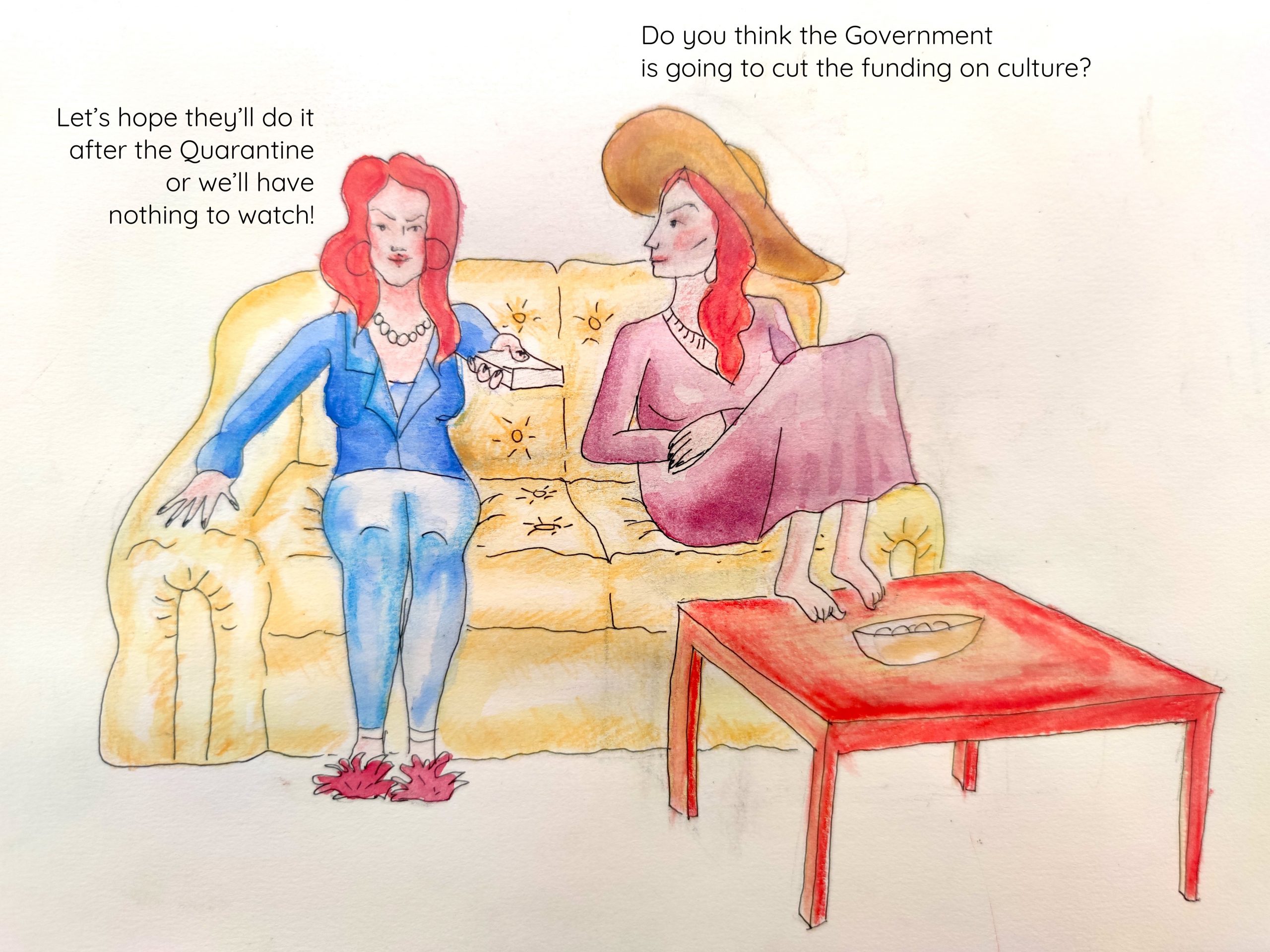
On a broader scale, ECF, the European Cultural Foundation, is not only active in Europe, but it works worldwide, especially in areas of the World where the cultural sector has always been facing challenges, such as Africa, for example. How do you see this current challenge elsewhere, and what contribution could ECF give?
Nikola Pucarevic (Amsterdam)
“Even within the EU there are many countries that didn’t yet start dealing with this (Italy, Slovakia), and of course outside of it (e.g.: Serbia). In Finland, cultural foundations already started to pool resources providing assistance both through government initiative and private help. And of course there are lots of local and spontaneous initiatives. The economic impact of COVID-19 is very clear, and there will be a spillover effect. We are learning to shift from physical to digital, but this definitely requires more time and planning that also needs to be compensated for. ECF has aid and benefit packages, also outside of the EU, however, there are yet unknown consequences of COVID-19 on the implementation of short and long term programs that will affect global cultural cooperation. The European Commission is starting to show some flexibility in regard to bureaucracy – this shows a higher level of solidarity, and this is something we want to encourage further.”
Violante Torre (Paris)
“On the one hand, there is a lot of questioning as per where the EU is in this. On the other hand we see forms of cross-border solidarity and flexibility from the cultural sector that is actually contributing to other sectors (fundraising initiatives in the field of health services, for example). It’s interesting to see this hybrid and paradoxical situation, as the cultural sector is one of the most impacted ones.”
What are the strategies that are being developed around Europe, by governments or local organizations, to respond to the crisis in the cultural sector?
Livia Filotico, Art Director and Creative Producer at Moon Festival
“The Arts Council and the National Heritage Fund in the United Kingdom have both unlocked relatively large sums of money to projects that are directly dedicated to tackle isolation and mental problems during this crisis. Museums and larger organizations are now focusing on digitalization. However, what we haven’t seen much is individual artists, small collectives and independent organizations come up with their own solutions.”
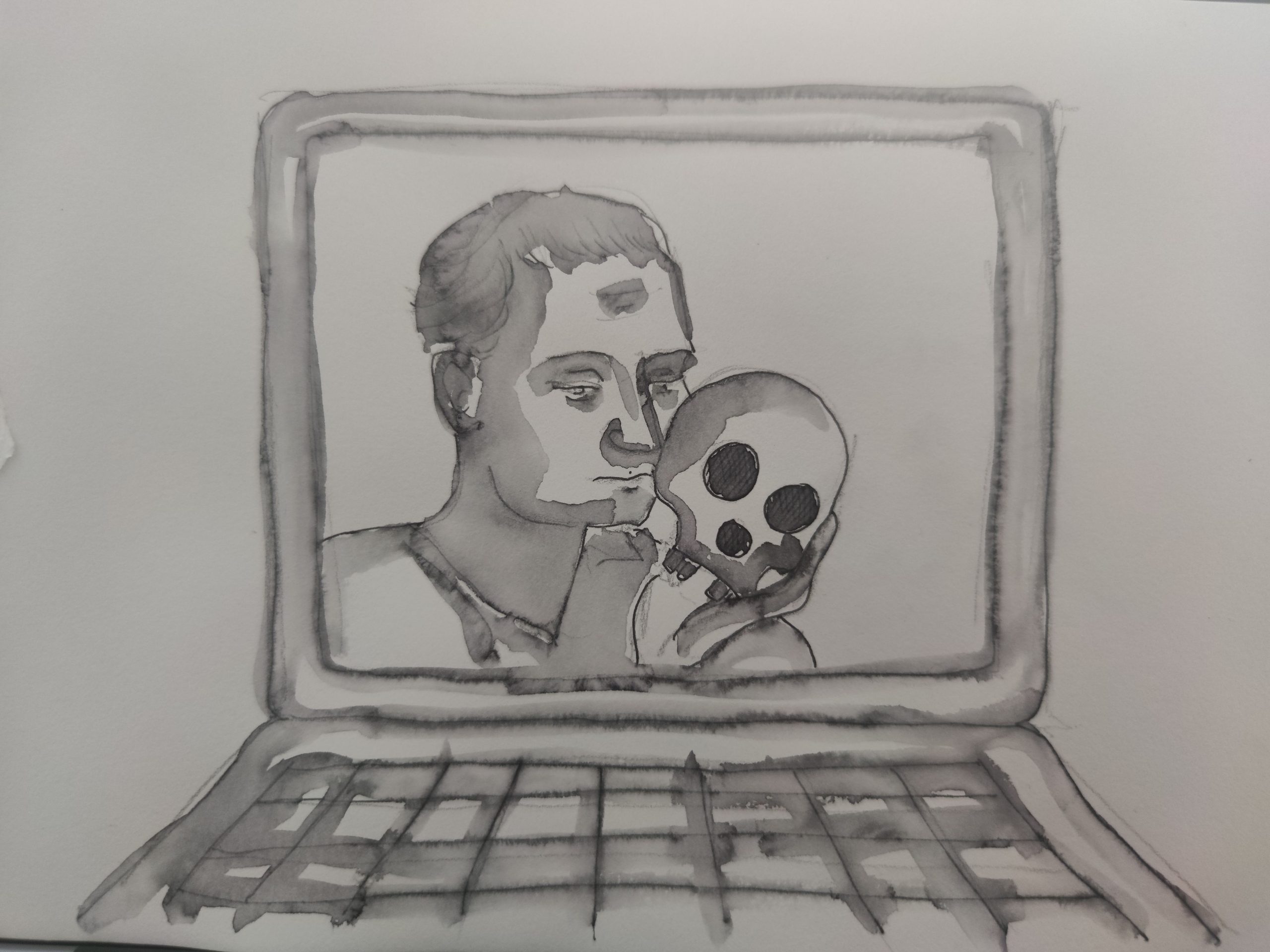
Miljenka Buljević, President at Clubture Network & Kulturtreger Association
“Clubture includes 57 member organizations from all over Croatia. We focus on the situation of independent organizations, and involved 33 organizations in a survey about the consequences of the COVID-19 crisis. Results were troubling: more than 500 events and programs were cancelled. These activities involve more than 900 people that will not be paid for their work. More than € 1 million have been invested and they are foreseeing more than 54,000 people in the role of audience and / or users. We will perfect the survey and will send results to the Ministry of Culture, pushing for aid for freelance artists. In addition to this, due to the recent earthquake, many organizations in Zagreb will also have to deal with structural damage. We will suggest three types of measures: measures that are concerning funds coming directly from the Ministry of Culture, EU social funds still managed by the Ministry and will advocate for stronger liaison with local institutions such as municipalities.”
Anikó Erdősi
“In the U.S. they are planning a 90-day rent freeze in order to support freelance artists and independent organizations. Let’s not forget that healthcare in the US is not free, making access to healthcare a privilege. The New York Art Foundation is providing grants that can help cover medical costs. On the other hand, the Federal Government responded very slowly and very weakly to this crisis. However, by the end of March they managed to provide an initial aid package for small businesses, so that many cultural workers will also benefit from that. But that’s still not enough. We also see heartwarming examples of how cultural institutions have joined forces to donate masks and other medical materials to hospitals and aid organizations. New Yorkers have always been very resilient and resourceful, so it is a pleasure to see that something is happening right now.”
Violante Torre
“ECF is a rather flexible and fast organization, and as a foundation we feel it is our duty to help. We will launch the Cultural Solidarity Fund on 6th April 2020 to support artists, organizations and civil society as a whole. We want to support creative ideas that can convey the value of solidarity, keeping in mind that we will need more initiatives and dedication to heal after the crisis. For the moment, it’s an open call with a one million € budget until the end of the year. ECF is also working on mapping initiatives so that more people and organizations can be informed about more initiatives aiming to support workers in the cultural sector.” Find out more about the mapping here.
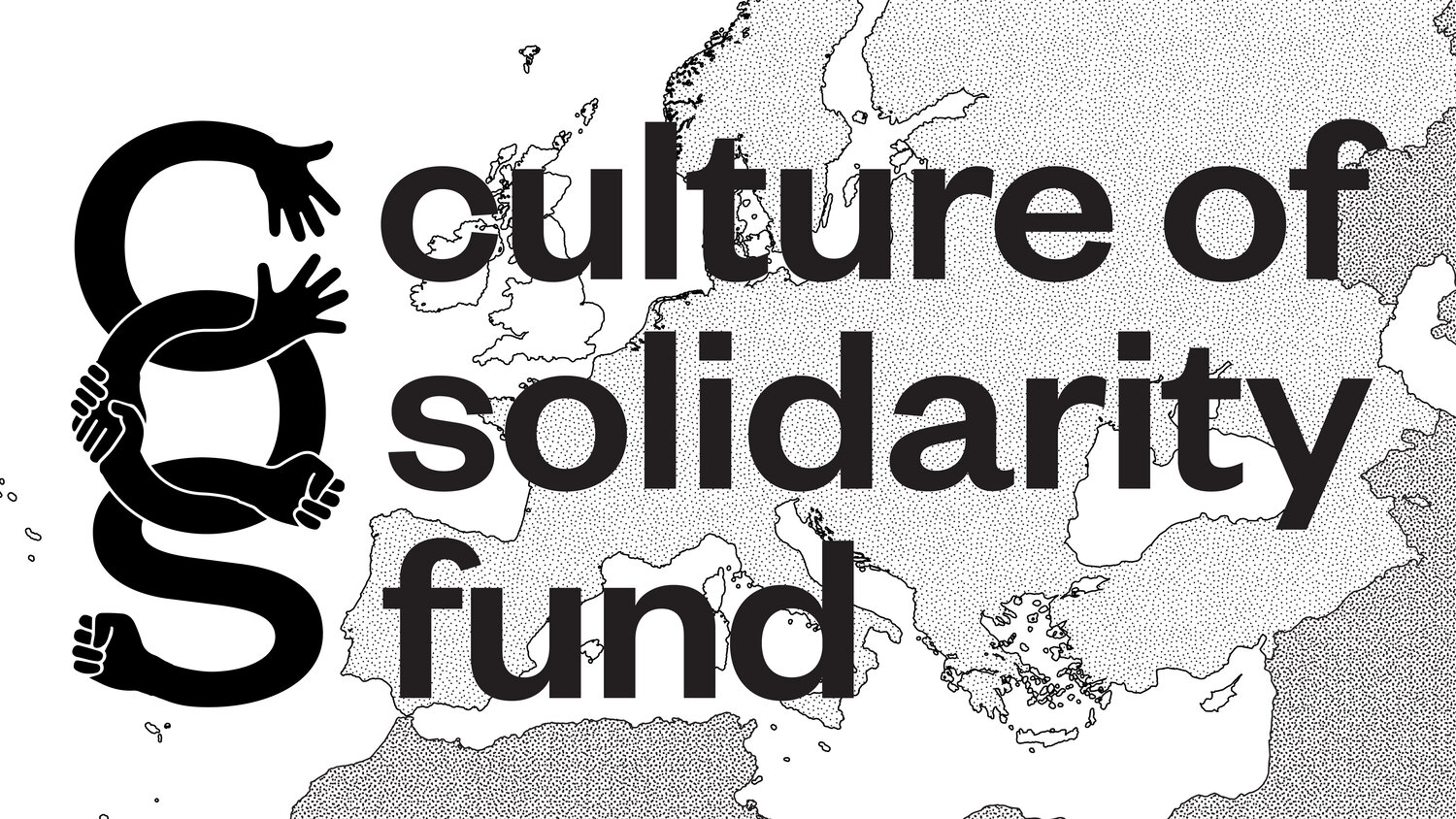
Bahanur Nasya – “Despite the fact that the cultural sector is one of the weakest ones, we saw how many cultural workers have been reaching out to people who are vulnerable through fundraising events aiming to support health services while tackling other social issues. But from the inner perspective, the main issue is that we don’t know how long this can last and we don’t know what will come after. The maintenance costs of cultural organizations are very high, and many of us are at risk of poverty. Not to mention the huge cultural loss that would originate from that. We should find ways to make sure that we use this experience to save people working in other sectors, without falling once again into the trap of saving the financial sector and larger companies before saving workers.”
What do you think the future will bring?
Livia Filotico
“I think there’s a lot of hope, and creativity is far from being dead. From what I’m hearing there are quite a lot of possibilities that are opening up in ways we would have considered impossible just a month ago, and I’m also talking about cooperation and initiatives that go beyond the schemes we are used to. I’m personally optimistic.”
Anikó Erdősi
“I think the situation is going to change. I agree with Fabrizio when he earlier mentioned that we will wake up in a very different world, and we won’t know in what conditions the cultural sector will be until we get there. We should take things step by step while never losing focus on how to make culture evermore sustainable”.
What is the role of public administration and how can cities help the cultural sector in this very delicate moment?
Luca Bergamo, vice mayor of the city of Rome
“We can tackle the issue from different angles. First, dialogue with the government advocating for better social security conditions. Social security should be made universally accessible, and unfortunately Italy is not there yet. There are about 170,000 freelance cultural workers who might be excluded from receiving subsidies. We want the government to understand they need to help, we can’t leave these people behind. Then, we are locally taking measures related to fund release. For example, we want to make grants more flexible, so that if a project comes to a halt they can still use the funds later, once the activity starts again. We also have a very large network to maintain. We own the National Theatre, the Opera House, 21 museums, music halls etc. We want to make sure that the funding we committed to these structures remains in order to keep both the activity and the jobs.”
While discussing and sharing experiences and points of view with our guests, we received a lot of input from our viewers. Here are some of the initiatives they told us about.
In the Czech Republic, the government is planning to give a one-time €1000 aid for independent cultural workers. The Ministry of Culture is reportedly trying to find new ways to support the sector. (Blanka Marková)
Special measures have been announced in Greece, but it looks like they are not covering all cultural workers (Nicholas Karachalis). Some cultural workers are trying to launch an online petition for the establishment of a fund for artists to unite and perform online, receiving aid and providing entertainment. (Nikos Chrysogelos)
In Portugal, the Ministry of Culture launched a €1 million emergency fund while the Calouste Gulbenkian Foundation launched a larger one, amounting to 5 millions. There is also a new privately-funded platform functioning as a kickstarter for cultural/artistic projects called www.portugalentraemcena.pt/. (Mariana Mata Passos)
In Tunisia, cultural workers gathered in a national workshop and are working together to create the “Covid-Art Alliance” advocacy network. (Wafe Belgacem)
The Municipality of Santa Pola, Spain, launched an initiative to support and celebrate the work of local artists while providing culture and entertainment for the people at home. www.culturasantapola.es/project/culturasantapolaencasa/
And now, time for dessert: an Italian saying goes, you can’t eat performative arts. Charlotte Barbera – Curator at Il menù della poesia, strongly disagrees with that. “Our activity began 10 years ago, when actor Marco Bonadei created this project. We are now a group of 23 people with the common aim to spread literature, poetry and theatre wherever there is conviviality – mainly in pubs and restaurants, but also in service stations on the motorway and once even in Paris at the Italian Embassy during the Italian Cuisine Week. We dress as waiters and propose “food for your soul”. You can choose one “dish” and we will “serve” it to you. We really wanted to do something useful while respecting our identity, so we decided to launch a charity initiative called “Contagi (di)versi” (an Italian play on words meaning both “different contagions” and “poetry epidemic”). Everyday, we publish a different menu on social media, and people can “order” their “poetry dish” via the phone. Revenues will be directed to Ospedale Papa Giovanni XXIII, the main hospital of Bergamo, one of the most affected cities in the country and in Europe. So far, in a couple weeks we collected €5000, and our first aim to reach €7000.” Il menù della poesia currently performs in Italian, English, French, Spanish and Polish.
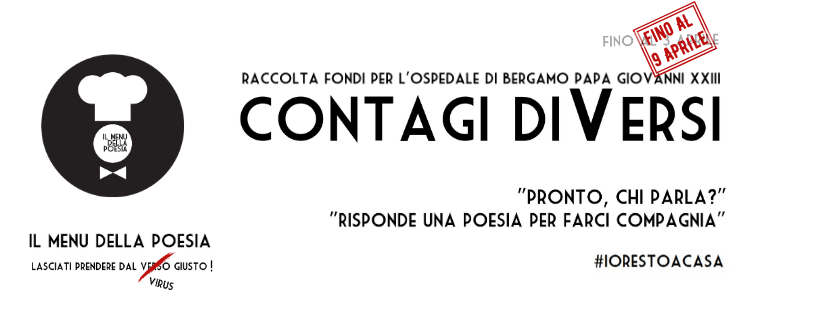
Donate to Associazione Culturale Il Menu della Poesia, IBAN: IT18L0306909606100000157367, Reason: “Donazione supporto emergenza Covid-19”
Watch the full episode


